13 Places Where You Can Retire on as Little as $1500 a Month
17 min readWhile the costs of everyday life may be rising back home, there are places overseas where $1,500 a month covers you for housing, healthcare, food, fun…the whole nine yards. And that’s for a couple. If you’re flying solo, you can call these places home for even less.
Thousands of folks have already discovered this and are taking advantage of it. So why not join them and start exploring your options today?
There are many good-value locales around the globe, but some truly stand out for their value. Here are 13 retirement spots on our radar where you can live on as little as $1,500 a month.
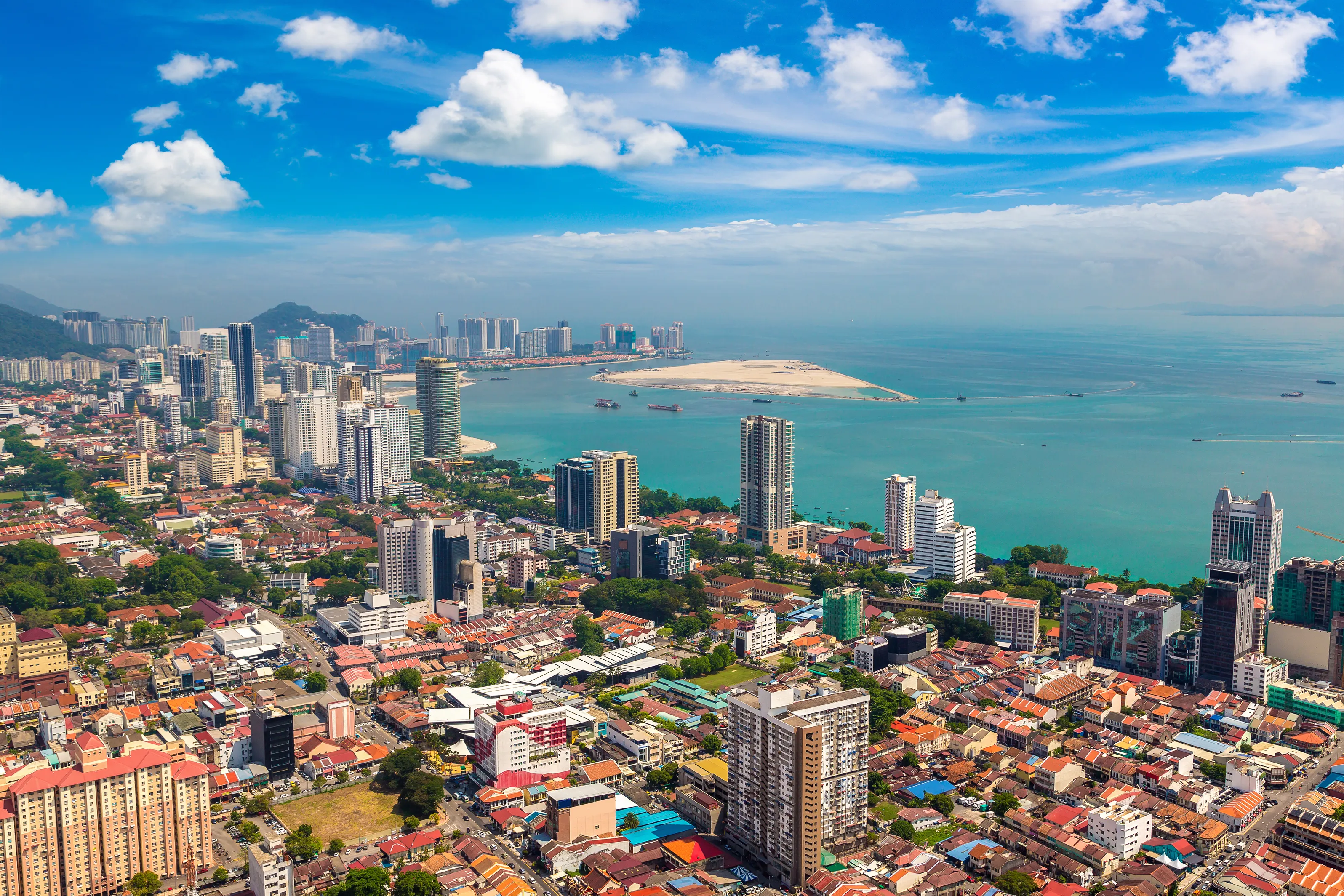
View of Georgetown, Penang. |©iStock/bloodua
The island of Penang unfolds as an enticing canvas, blending history, golden beaches, and a cultural mosaic that positions the island as a top-tier destination. George Town, the charismatic capital of Penang, where meticulously preserved early 19th-century structures infuse the lively streets with a sense of nostalgia, creating a charming colonial backdrop.
A vibrant population of 1.6 million residents converges to shape a dynamic and diverse atmosphere. Malays, Chinese, Indians, and expats coexist seamlessly, crafting a cultural synergy that defines daily life on the island. Penang is not merely an island residence; it embodies an immersive experience, a daily celebration of cultural exchange and harmonious coexistence.
Beyond its cultural richness, Penang stands out for its cost-effective living and first-rate healthcare. Picture securing a three-bedroom condominium with sweeping sea and hill views within a five-mile radius of the city center, all for an affordable $380 a month. Monthly living costs, excluding housing, are remarkably budget-friendly—a mere $500 for a single person and $1,000 for a family of two. This financial accessibility adds an extra layer of allure to Penang, rendering it a compelling destination for those seeking a comfortable and economical lifestyle.
Indulge in the local scene by savoring a $3 cappuccino, or opt for the authentic experience with a $1 cup of local coffee. Dining out is a pleasure, too, with a three-course meal for two costing around $15, offering residents ample opportunities to explore the vibrant food scene without breaking the bank.
Chiang Mai, Thailand
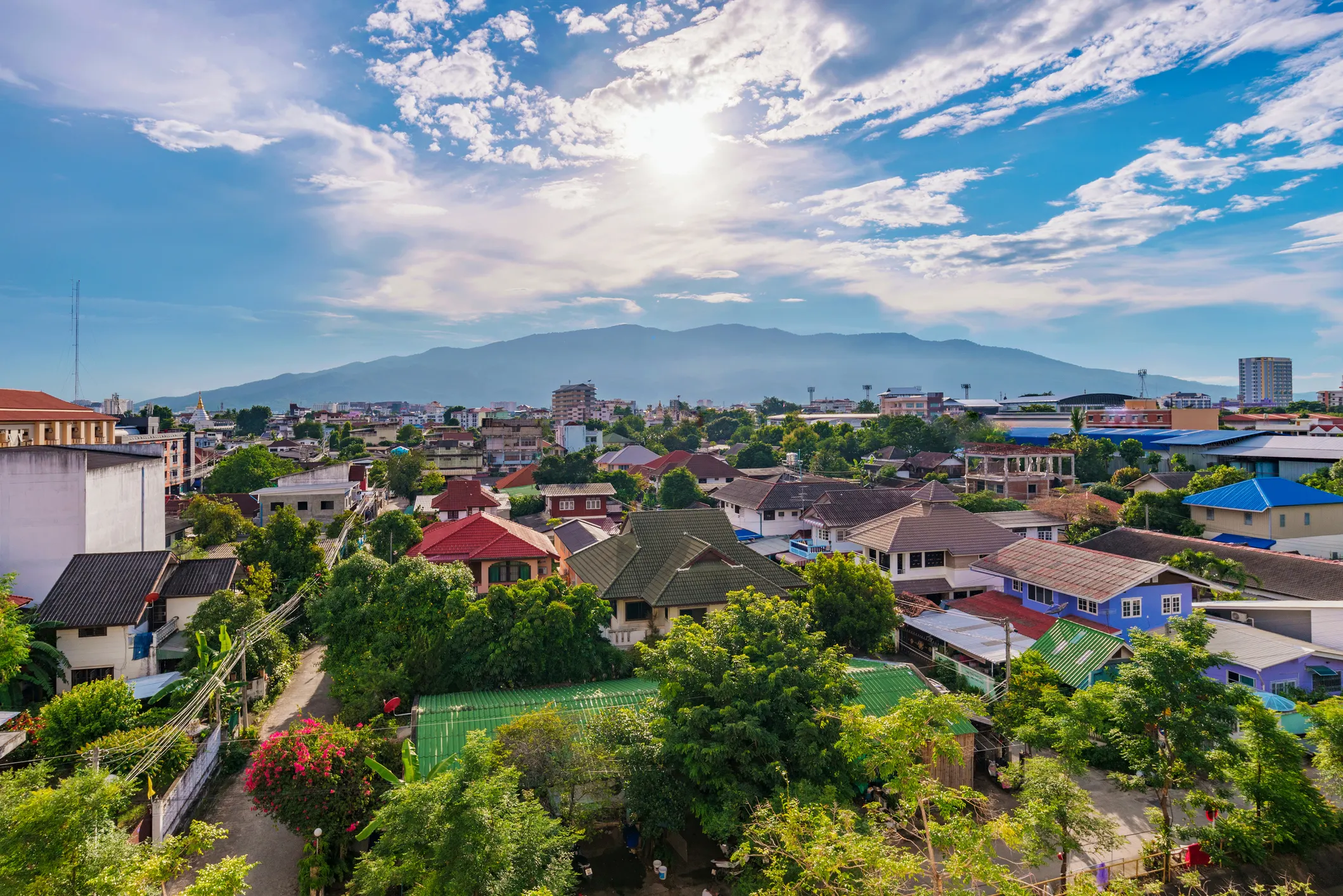
©iStock/stockinasia
Chiang Mai in Thailand is where the allure of an ancient city nestled in the northern Thai mountains beckons. Since its founding in 1296, Chiang Mai served as the capital of the Lanna Kingdom until 1558. Today, its Old City, surrounded by walls and a moat, hosts hundreds of mesmerizing Buddhist temples, showcasing the city’s cultural and religious significance.
Inhabited by 127,000 residents, Chiang Mai radiates with a lively and diverse atmosphere, where Thai, Chinese, Indians, and expats coexist seamlessly. More than just a place to live, Chiang Mai offers an immersive journey through different cultural eras, with echoes of its past resonating at every step.
Chiang Mai’s appeal extends beyond its historical and cultural richness to an affordable lifestyle, complemented by a temperate mountain climate. Imagine securing a three-bedroom condominium with panoramic hill views within walking distance or nestled within the Old City center for a very reasonable $300 a month. Monthly living costs, excluding housing, are remarkably expat-friendly— $300 for a solo explorer and $1,000 for a family of two. This financial feasibility enhances the city’s charm, beckoning those searching for a comfortable and cost-effective lifestyle amidst ancient cultural splendor.
Immerse yourself in the local scene with a $2 Americano, or opt for an authentic experience with an 80-cent cup of local coffee. Dining out becomes a delightful adventure, with a three-course meal for two costing around $10, allowing you to savor the vibrant food scene without straining your budget.
Chiang Mai extends a warm invitation to explore its history, culture, and affordability. Every corner whispers stories of the past, while each meal becomes a culinary journey. It’s more than just a city; it’s an open invitation to step into a timeless experience, where the pulse of the present beats harmoniously with the echoes of the past. So, pack your bags and let Chiang Mai weave its enchantment of culture, affordability, and breathtaking landscapes for you to unravel.
Simply enter your email address below to sign up for our free daily postcard e-letter and we’ll also send you a FREE report on The World’s Top 10 Retirement Havens for 2024.
By submitting your email address, you will receive a free subscription to IL Postcards and special offers from International Living and our affiliates. You can unsubscribe at any time, and we encourage you to read more about our Privacy Policy.
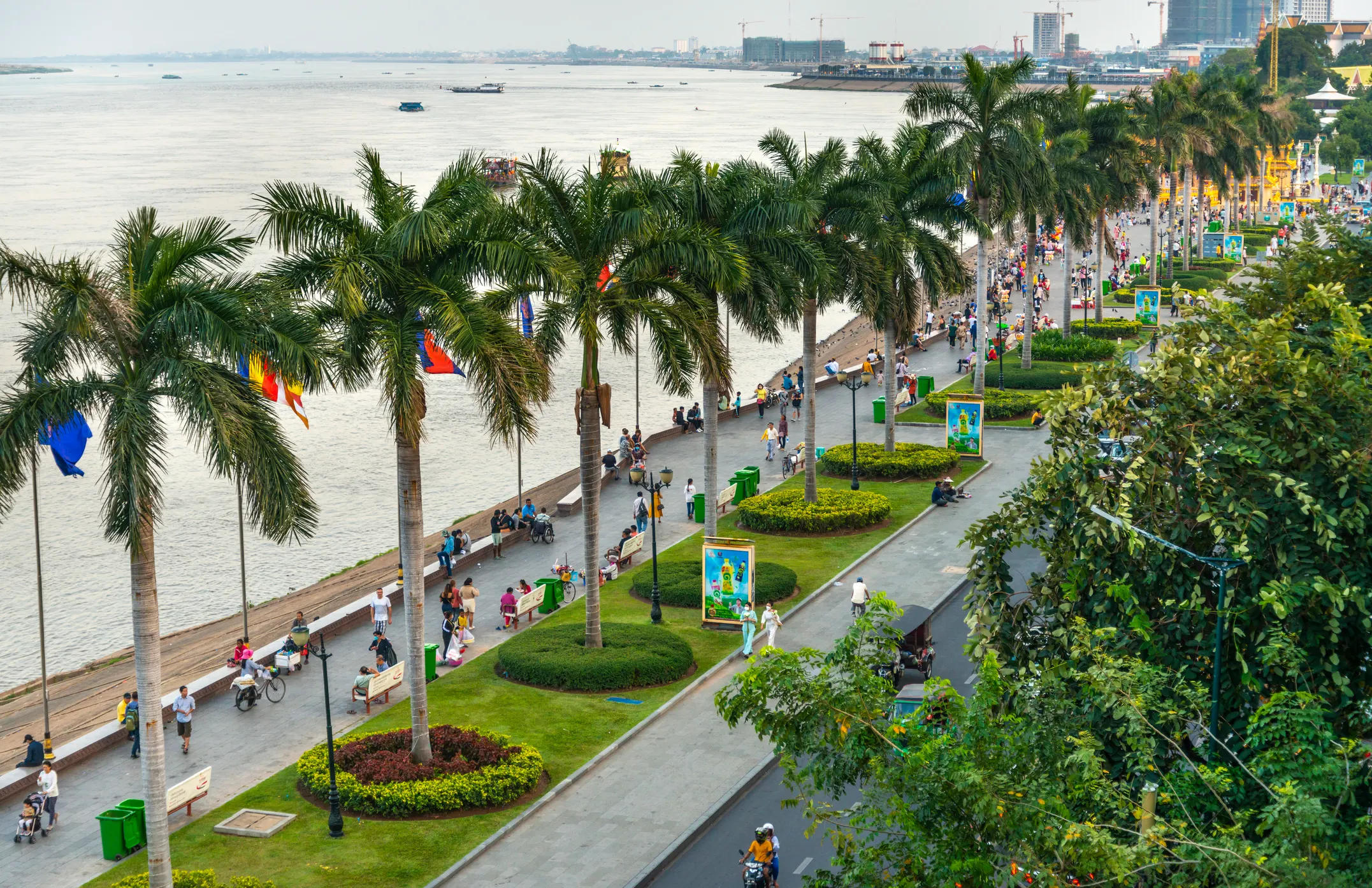
©iStock/Neil Bussey
Phnom Penh, Cambodia’s busy capital, sits at the junction of the Mekong and Tonlé Sap rivers. It was a hub for both the early Khmer Empire and French colonialists who followed in the 19th century. Its architecture, a mix of French and Khmer, is worth the trip alone. But that’s not all—there’s more! The Cambodian French food fusion award-winning restaurants are what make this city special. Every meal is an experience. Every meal will have you drooling in anticipation of the next serving, wishing it would never end.
Its population of 2.3 million souls is spread over a wide area, and there are times when walking down its wide boulevards when you are completely alone. It’s also fashionably French, and eating at The Foreign Correspondents Club allows not only views of the Mekong River but also its fashionable residents. A three-course meal there for two people can cost as little as $40—a beer at a local bar nearby is just 75 cents.
This is a walking city, and just a 15-minute walk from The Foreign Correspondents Club, you’ll find -bedroom, 900-square-foot apartments for $1,100 per month. Living costs, if you live like a local and shop locally, which is a lot of fun, are $300 per month.
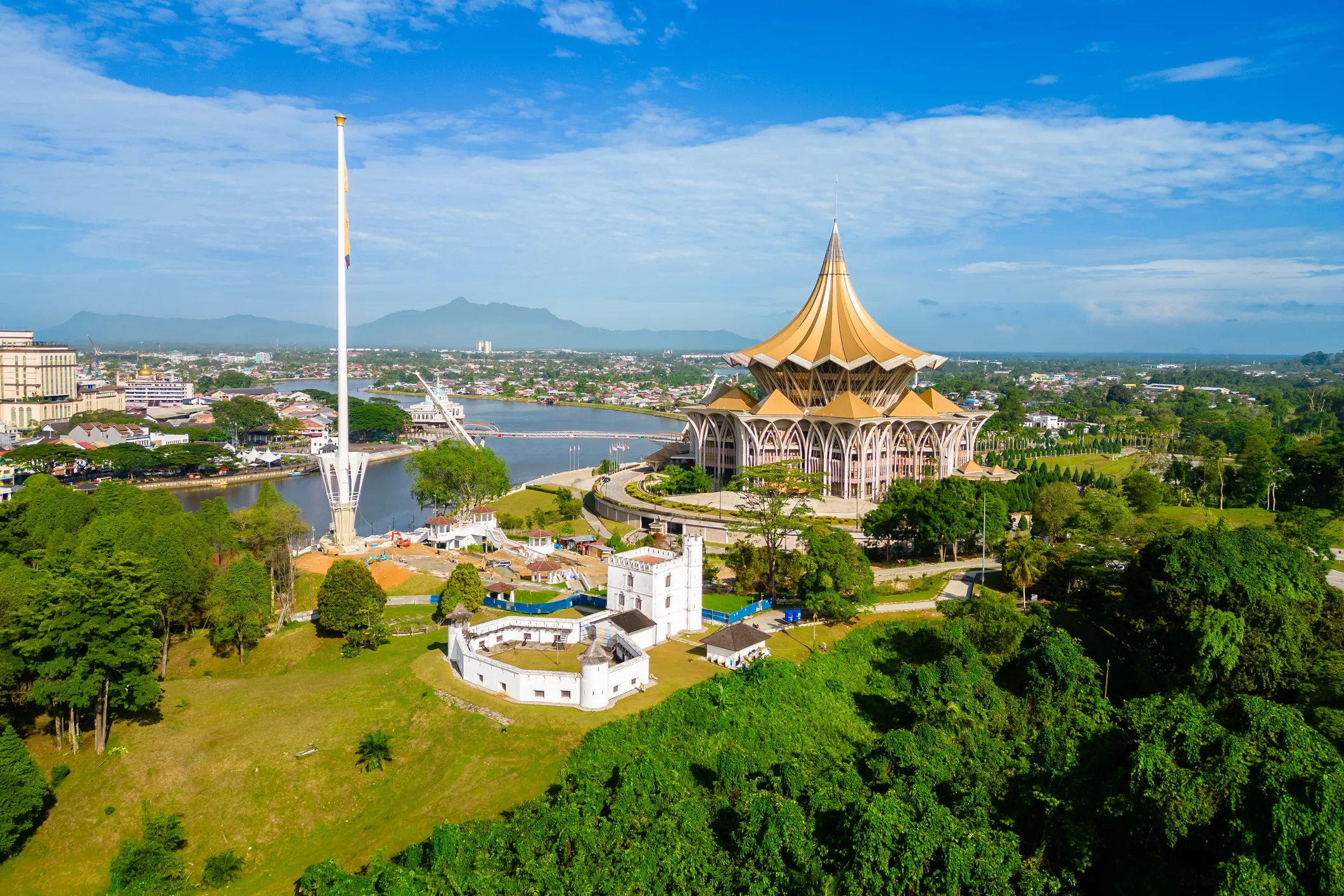
©iStock/Jui-Chi Chan
Kuching is the capital of the state of Sarawak on the island of Borneo. Founded in 1839 by Sir James Brooke, it is now a diverse city of old colonial buildings and modern towers. Its bustling streets are full of food stalls and juice vendors, which give it vibrancy, unlike any other town in Malaysia.
Often referred to as the ‘Land Beneath the Wind,’ a term coined by American author Agnes Keith when she moved to Kuching in the 1920s, it was also the chosen capital of Raja Brooke. Nestled along the tranquil Sarawak River, this lively city is renowned for its vibrant café culture. Functioning strategically as a trading post, Chinese trading fleets are known to have visited in the 1600s; it seamlessly connects Asian seaports with the lush, rich interior of Borneo. Thanks to its close proximity to national parks, Kuching emerges as the perfect starting point for thrilling day trips to explore wild coastal and rainforest destinations.
This is a café culture, and a very good cappuccino will cost just $3. The local coffee is also good and strong, and at $0.60 a cup, it is an amazing value. Kuching city is very pretty. The river that slowly meanders through the town, with Raja Brooke’s palace on the far side facing the town, makes this a very attractive city to live in. With numerous antique stores facing the river, you can easily spend a day meandering in and out of them yourself. A three-bedroom house on the river, within walking distance of town, will set you back $700 per month. Monthly living costs for a couple, excluding housing, are an additional $500.
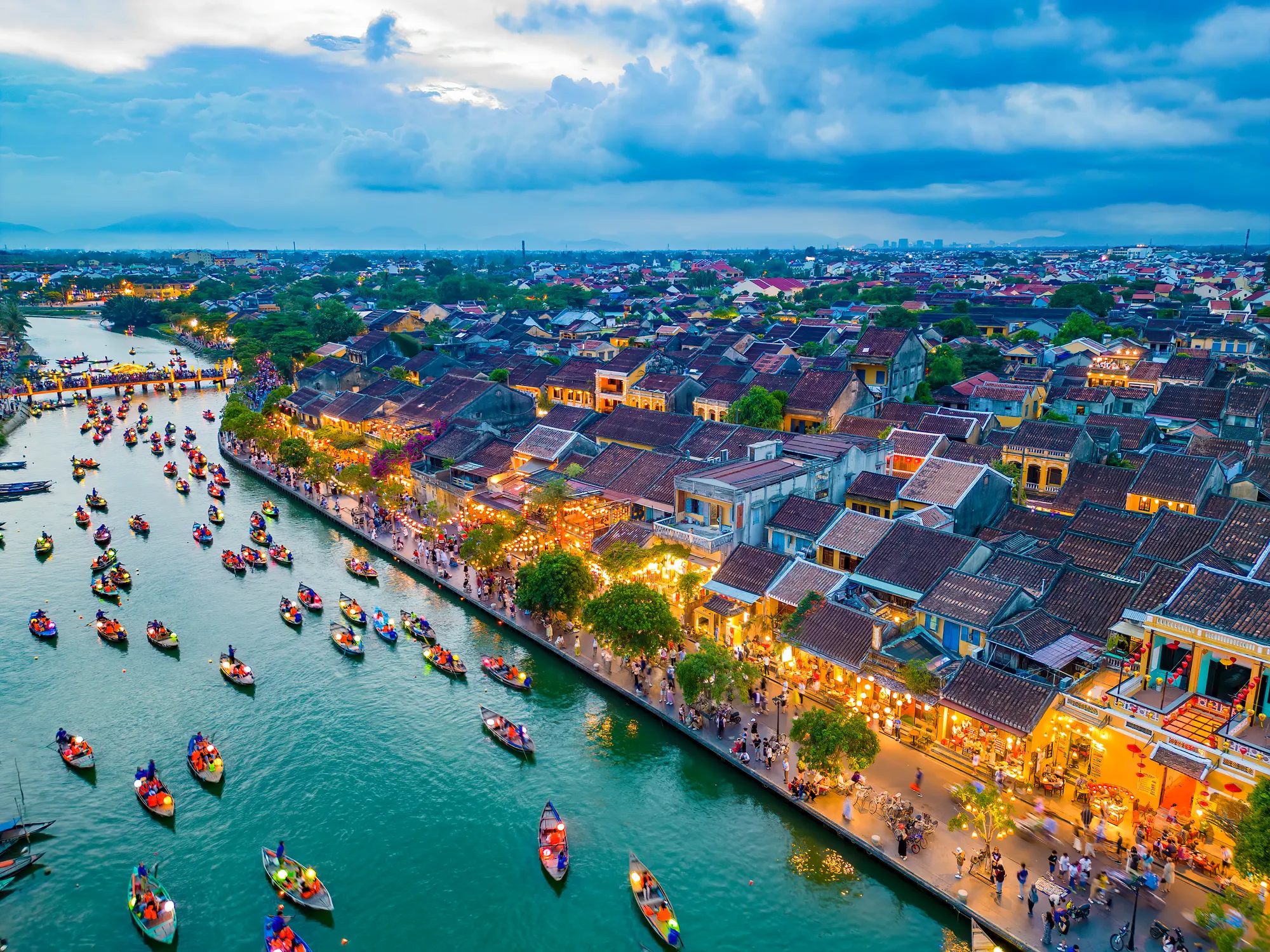
©iStock/IamKien
In 1999, Hoi An was designated a World Heritage Site. Its setting along an estuary of the Thu Bon River and its proximity to some of the prettiest beaches in all of Vietnam gave it an allure that attracted visitors from all over the globe, and Hoi An grew into one of the country’s most popular and prosperous small cities.
The heart of the town is a tranquil haven, with its central area off-limits to cars and motorbikes. This pedestrian-friendly environment invites leisurely strolls, providing an enchanting setting for exploration.
Vietnam, recognized as one of the world’s largest coffee producers, boasts high-quality and affordable coffee. With a price tag of just $1.50 per cup, indulging in a cappuccino here is a delight that won’t break the bank. The rental landscape is good value, too, with a two-bedroom apartment in the center of town costing as little as $500 per month.
Two people could live a comfortable, middle-class lifestyle here for well under $1,500. That includes rent, all utilities, a weekly housekeeper, eating out at least once a day, incidental expenses, and all the time at the beach that you could possibly desire.
Many of the services and goods that foreigners want are available right in Hoi An. There are many excellent restaurants, imported food shops, an international school, lively markets, and great shopping, especially for clothing.
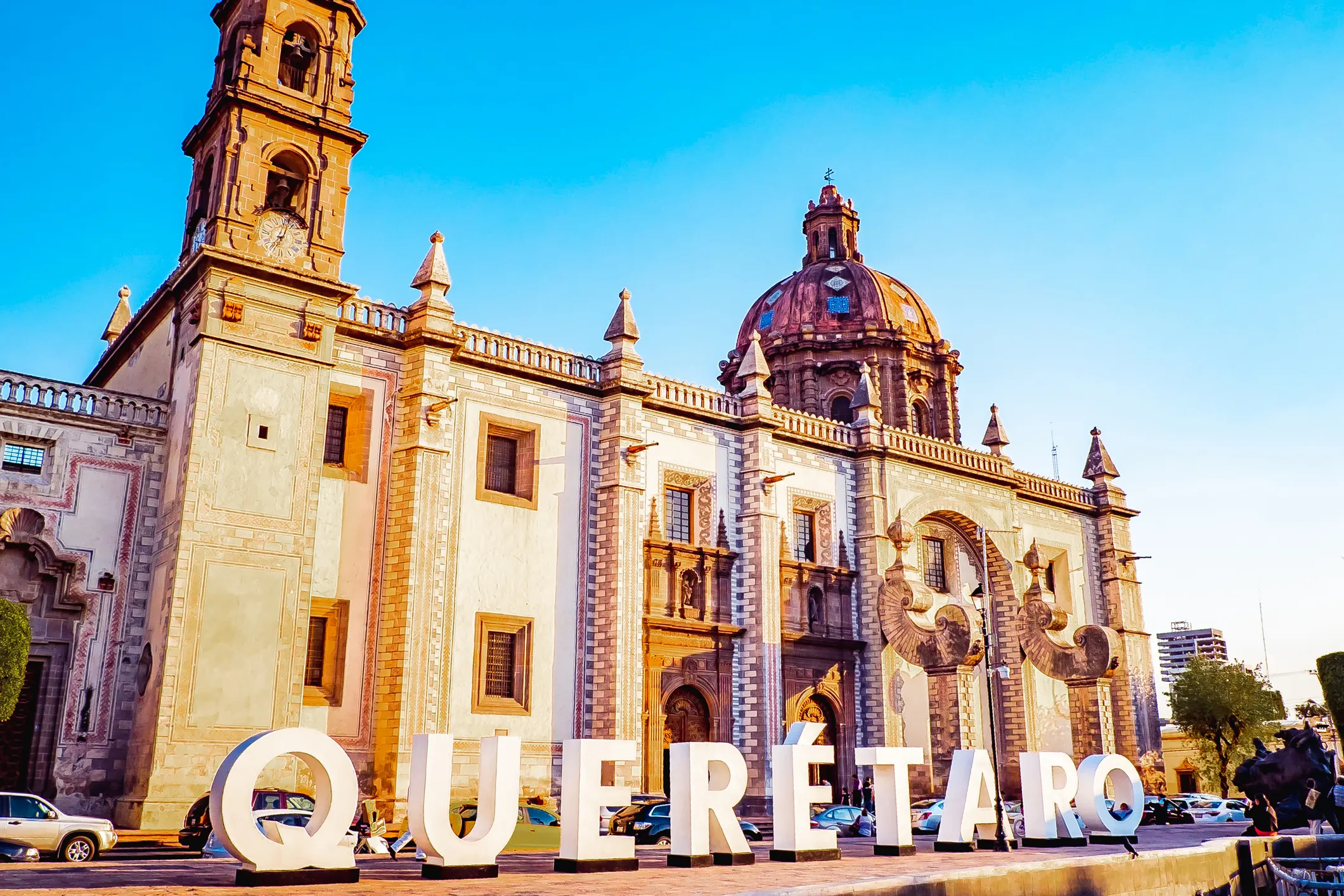
©iStock/Indigoai
Only a few years ago, not many people outside Mexico had heard of Querétaro. Today, the city’s reputation is growing. In fact, it’s rapidly becoming a favorite city for North Americans and Europeans. The population of the metropolitan area is over 1 million and continues to grow, as businesses and business executives from Mexico City relocate to Queretaro’s more livable environment.
Querétaro’s central historic center is a delight—plaza after plaza of fountains, bandstand gazebos, and gorgeous green trees surrounded by stately baroque-style buildings that house restaurants, hotels, museums, municipal buildings, shops, and offices. Querétaro is truly alive. Street musicians, fire jugglers, mimes, and street dancers show off their special skills. Time can get away from you here, and you may find yourself strolling home in the wee hours after dinner and entertainment.
The medical care in Querétaro is excellent in any of the city’s several private hospitals. And as Querétaro is just over two hours from Mexico City, you’re within easy access of international flights home. Or, if you prefer, use the local airport. It offers direct flights to several hubs in the U.S., including Dallas/Ft. Worth, Houston, and Chicago, as well as domestic flights to other points within Mexico.
Despite it being a major city, Querétaro offers a surprisingly low cost of living. Its mild climate keeps air conditioning and heating costs low. For shopping, the city offers a range of options at a variety of price points: from local stores to warehouse options like Costco and Sam’s Club, and to department stores like the high-end Mexican chain Liverpool.
Expats living in Querétaro report the ability to live on just $1,500 or less per month—all in, including rents from $500 per month for a one-bedroom apartment and dinners out for about $25 for a couple in some of the best mid-range restaurants in town.
Simply enter your email address below to sign up for our free daily postcard e-letter and we’ll also send you a FREE report on The World’s Top 10 Retirement Havens for 2024.
By submitting your email address, you will receive a free subscription to IL Postcards and special offers from International Living and our affiliates. You can unsubscribe at any time, and we encourage you to read more about our Privacy Policy.
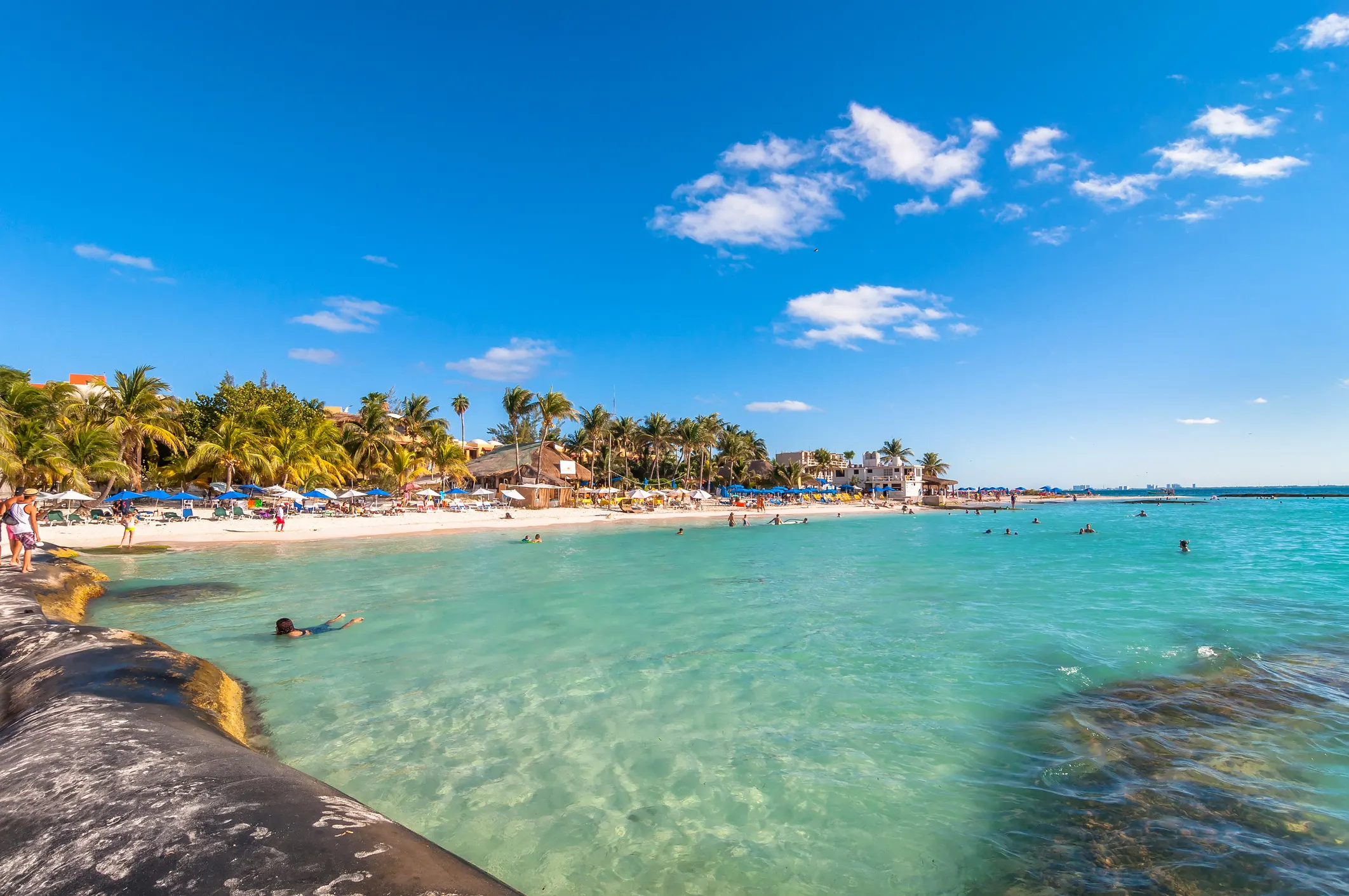
©iStock/eddygaleotti
A short twenty-minute ferry ride from Cancun will land you on Isla Mujeres’ beautiful shores. Arriving into a vibrant and colorful Mexican Caribbean vibe steeped with Mayan influences, this small island packs a lot into it. Being a major tourist destination of the Yucatan and Riviera Maya, the calm northern white sand beaches are bustling with restaurants, hotels, shopping, and luxury.
Unlike other islands, you don’t need a car on Isla Mujeres. Most people cruise around in golf carts or take the hop-on hop-off bus, which runs the length of the island and costs just over a dollar to get where you need to go. Supermarkets, hotels, neighborhoods, the friendly drivers drop you at your door whenever possible.
Popular as a day trip, the northern end is the expensive tourist hotel zone. Once you leave the tourist zone, locals and expats mix in happy co-existence, and the prices drop. Apartments with all utilities included can be found for $600 a month, and while healthcare is limited to GPs, most things can be taken care of by doctors and pharmacies. For specialists and major health issues, a quick trip to Cancun is needed.
A liter of freshly squeezed juice perfect for a beach day is only $3 and packed with restaurants; you can enjoy everything from fine dining to seafood on the beach in the hotel zone. Of course, if you eat in the tourist zone, expect to pay. Or, enjoy great, fresh, delicious meals at local kitchens where a three-course meal is $5 to $6. Around town street food stalls with various traditional Mexican foods like tlacoyos are perfect for an amazing filling meal for $1.75 provide a real taste of Mexico. But be quick; they sell out fast!
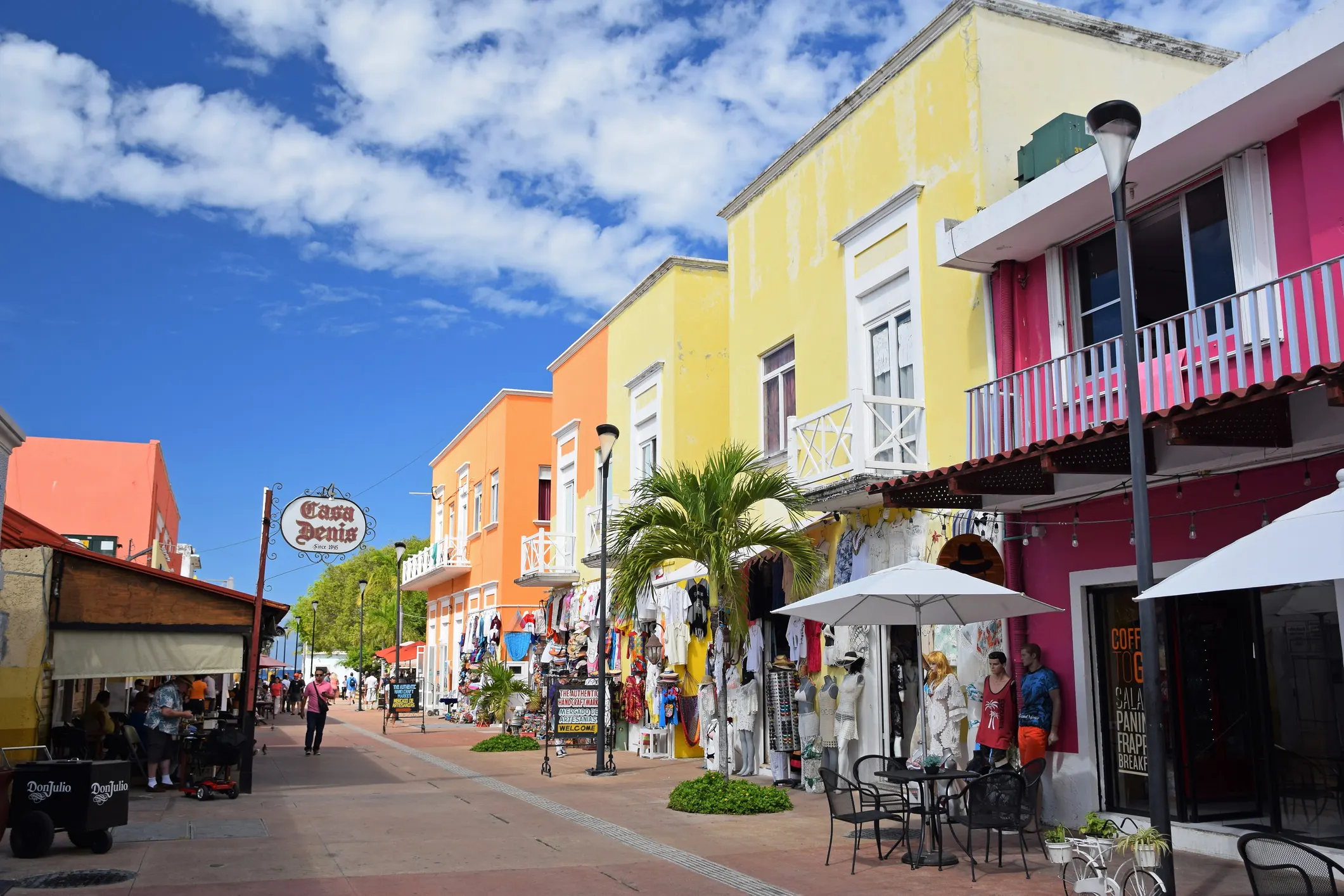
©iStock/Tramino
Cozumel’s laid-back island vibe, white sand beaches, multi-hued Caribbean blues, and stunning natural beauty attract an international mix of residents. The Caribbean’s largest cruise port, Cozumel, is also a world-renowned scuba diving destination and nature lover’s paradise with rich Mexican and Mayan cultures woven through daily life.
The main township of San Miguel de Cozumel caters to every taste, from souvenirs and nick-knacks to shopping for duty-free diamonds and luxury brand items. But don’t let that fool you; many expats live comfortably for $1,500 a month. Even in the more affluent suburbs, close to major supermarkets and a mere fifteen-minute walk from the town center, you can find an unfurnished one-bedroom apartment for $500 a month.
With over 350 restaurants on the island offering every cuisine, there’s something for every tastebud and budget. You’ll find local kitchens with freshly made authentic Mexican food where you can get a three-course meal for $5 to $6. Or enjoy five-star dining overlooking the water, sipping cocktails while watching the Caribbean sunset where the ‘surf’ in surf and turf is lobster for only $23, and a meal for two is around $60 to $80. No matter where you eat, you’ll find a nice blend of friendly locals, expats, and tourists.
Because a large portion of the island tourism is from cruise ships, there is top-notch health care, dentistry, and a wide range of health professionals. English-speaking healthcare professionals are widely available, so life is easy to navigate without leaving the island.
Spanish colonial architecture blends with vibrant Mexican color throughout town, with most of the island’s nearly 60,000 inhabitants painting their houses in beautiful shades of every color of the rainbow. Art lines the streets with large murals complimenting the island’s Mayan heritage or ocean-loving vibe, making any art lover happy just walking around.
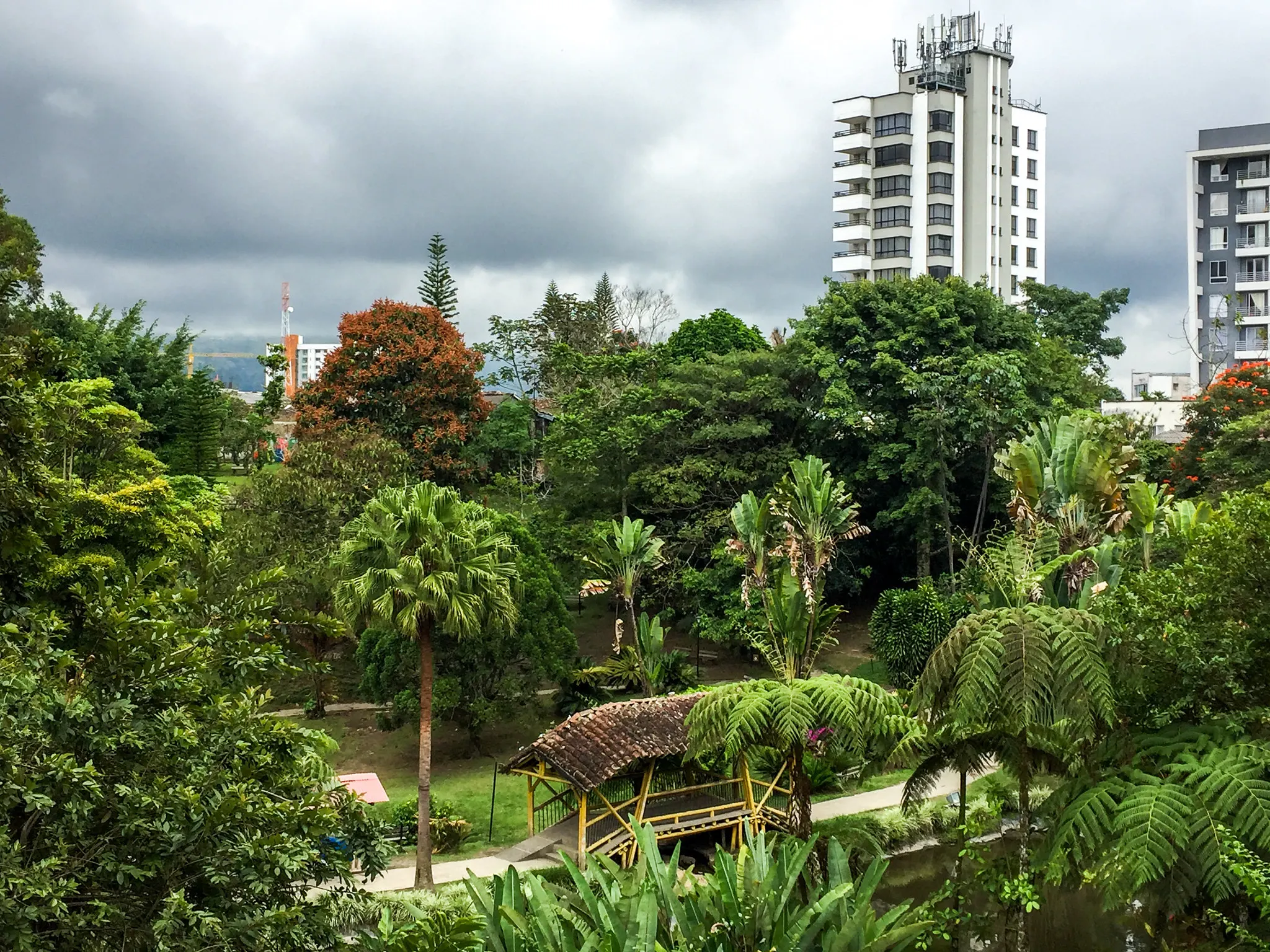
©Jason Holland
The city of Armenia, Colombia, has a natural beauty and captivating coffee culture that makes it very appealing. It’s also an affordable option for anyone who wants the benefits of a mid-size city and easy access to spectacular colonial towns and natural parks. Sometimes called the “eternal spring” city, Armenia has year-round warm weather, allowing farmers to extend their growing season and residents to buy locally sourced eggs, coffee, and meat any time. Fresh fish, bananas, avocadoes, plantains, and yams are also affordable options.
Armenia has a population of just over 300,000 people, fluctuating because of farm worker migration and tourism. The city has many free or low-cost activities available, though sometimes, you need a short car ride to get to them. Residents enjoy visits to Parque del café and Quimbaya Gold Museum and use the many hiking trails around Valle de Cocora for minimal entry fees. Armenia is a stone’s throw from beautiful palm tree forests and bird sanctuaries, and across the city, there are plenty of green spaces like Parque de Los Fundadores and El Arbol de Amor.
Quindio department is known for its plant life diversity and the Quindio Botanical Garden, located just five minutes outside of the city, personifies this part of Colombia’s heritage. The city hosts festivals and cultural events like the International Music Festival and the National Coffee Festival. Armenians have a deep connection to their coffee culture and will happily share their knowledge with foreigners. The Coffee Triangle is recognized as a UNESCO World Heritage site thanks to its unique and sustainable cultivation methods. Coffee is easily accessible, and you can get a cup for less than $1. Restaurant meals are typically $12 to $15 a person.
The city is a good choice for anyone who wants to rent rather than buy or is hoping to avoid the competitive real estate market of towns like Salento and Finlandia. As a single person, you can expect to pay between $400 and 550 for a one-bedroom apartment and about $200 for food. Those willing to live outside of the city center can find something for less.
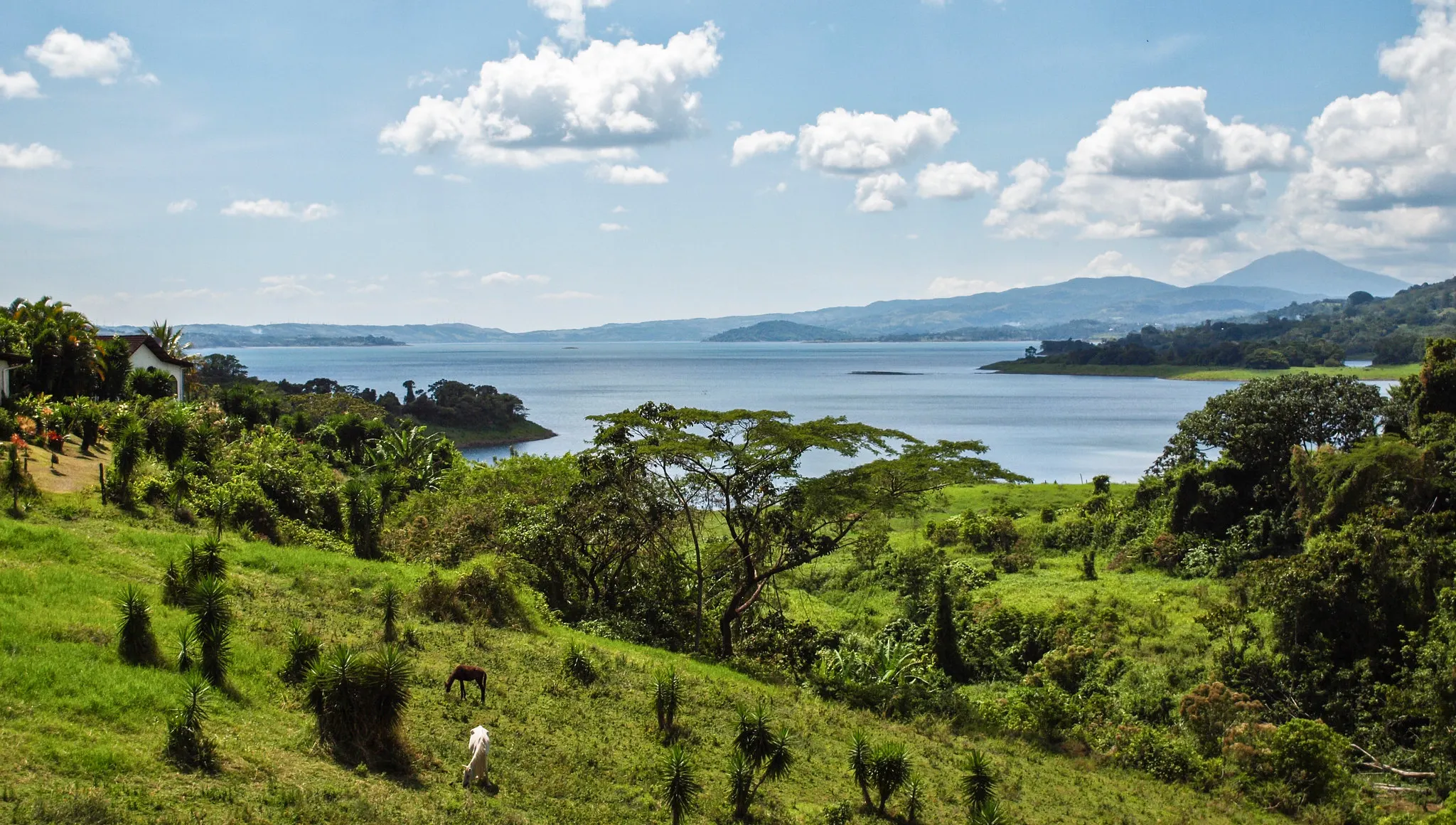
©Jason Holland
People come to live around Arenal, about three hours north of San José and three hours east of Liberia, the capital of the Guanacaste province, because they fall in love with these views. The weather—not humid, just moderate and breezy—is also a big draw. So is the affordable real estate and low cost of living. It’s laidback and peaceful.
There’s plenty to do, especially outdoors. Hiking in the rainforest surrounding Volcán Arenal, at the east end of the lake, you can see more than 200 species of birds, as well as monkeys, coatis, and other picture-perfect wildlife.
Ironically, a region with an active volcano would have had a low profile, but that was pretty much true of the Lake Arenal area until a few years ago. A few expats and many ticos knew about the region, but it didn’t attract nearly as much attention as the Central Valley or the Pacific Coast.
Now, the situation has changed. Lake Arenal is home to an increasing number of Americans, Canadians, and other foreigners who enjoy living in one of Costa Rica’s most spectacular regions. It’s also on the map for expats looking for real estate bargains.
Bev Berry relocated from California to Tronadora, a small town located on the southwestern shore of Lake Arenal. She reports that she is able to live on a budget of $1500 or less per month, with rent costing her just $400. Depending on the restaurant, a meal out can cost anywhere from $6 to $15, while a typical breakfast at a local soda costs $3.50.
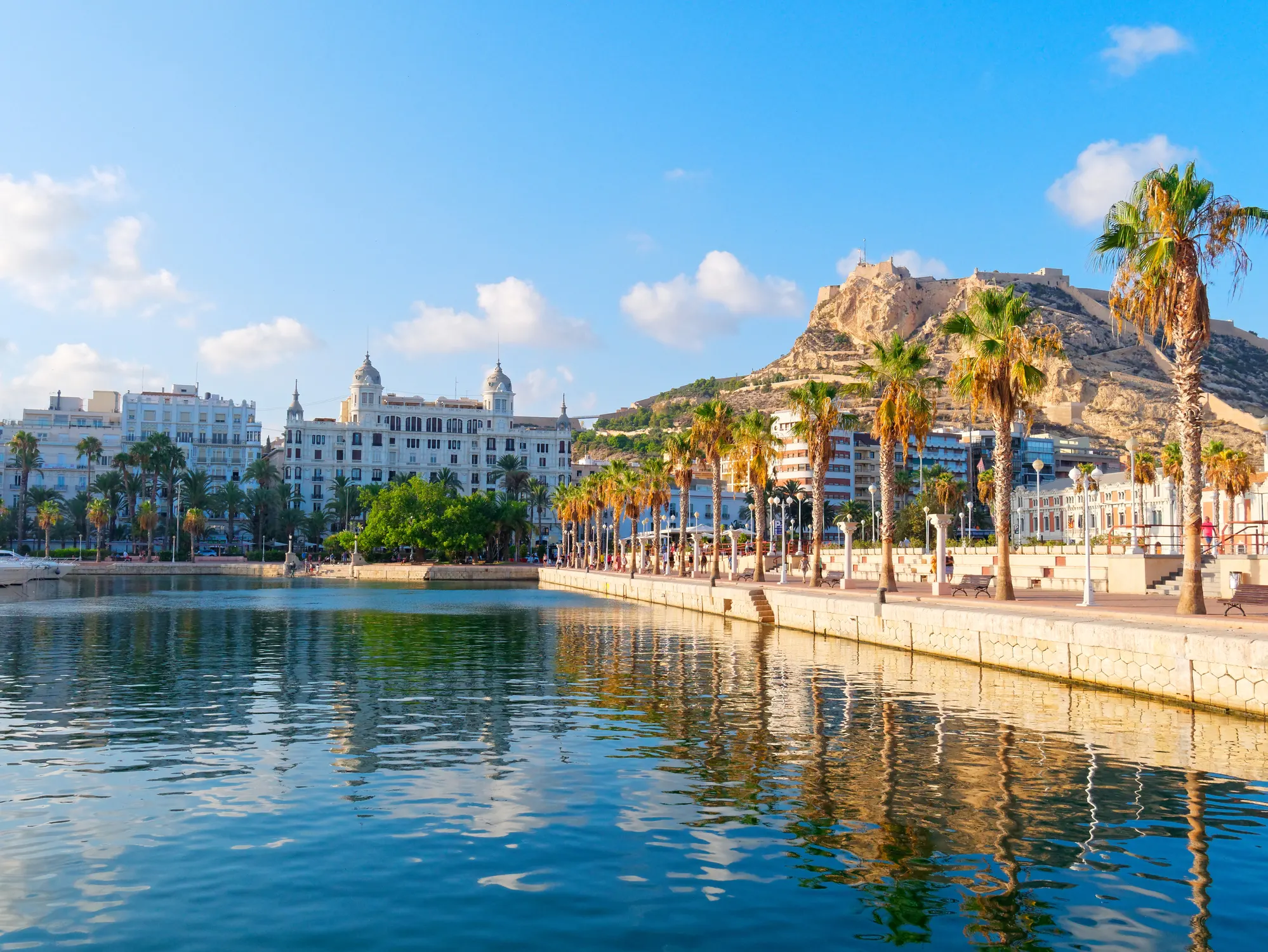
©iStock/kkoszowski
Nestled on the sun-drenched Costa Blanca, Alicante is more than just a gateway to Spain‘s eastern coast; it’s a symphony of historic charm, relaxed seaside living, and vibrant street life. The city, with its castle-topped mount and sun-kissed marina, invites a slower pace of life, where the Mediterranean Sea whispers tales of the past to those who wander its palm-lined esplanade.
Alicante houses a diverse population of about 330,000 residents, creating a tapestry of cultural influences reflected in its traditional cuisine, countless festivities, and day-to-day interactions. This harmonious blend of Spanish heritage with a cosmopolitan flair makes Alicante a place to live and thrive in cultural richness.
Affordability is one of Alicante’s shining features. Imagine residing in a chic apartment in the heart of the city or a cozy home with a view of the tranquil Mediterranean, all for less than $700 a month. The cost of living here is a breath of fresh air for budget-conscious couples. With monthly expenses, excluding rent, averaging around $700 for two, the financial ease allows for a lifestyle that cherishes comfort and quality.
Alicante’s culinary landscape is a paradise for food enthusiasts. Relish the local flavors with a $2 traditional Spanish coffee and croissant, or explore the myriad of tastes in local markets and restaurants. The three-course lunch menu of the day averages $12 per person, including wine, beer, or water. A romantic dinner for two in a quaint bistro averages around $35, offering affordable luxury to savor the local gastronomy and wine.
In Alicante, life is not just lived; it’s celebrated. From its stunning beaches and historical sites to its affordable cost of living and rich cultural tapestry, Alicante is an ideal destination for couples seeking a serene yet culturally rich lifestyle under $1,500 a month.
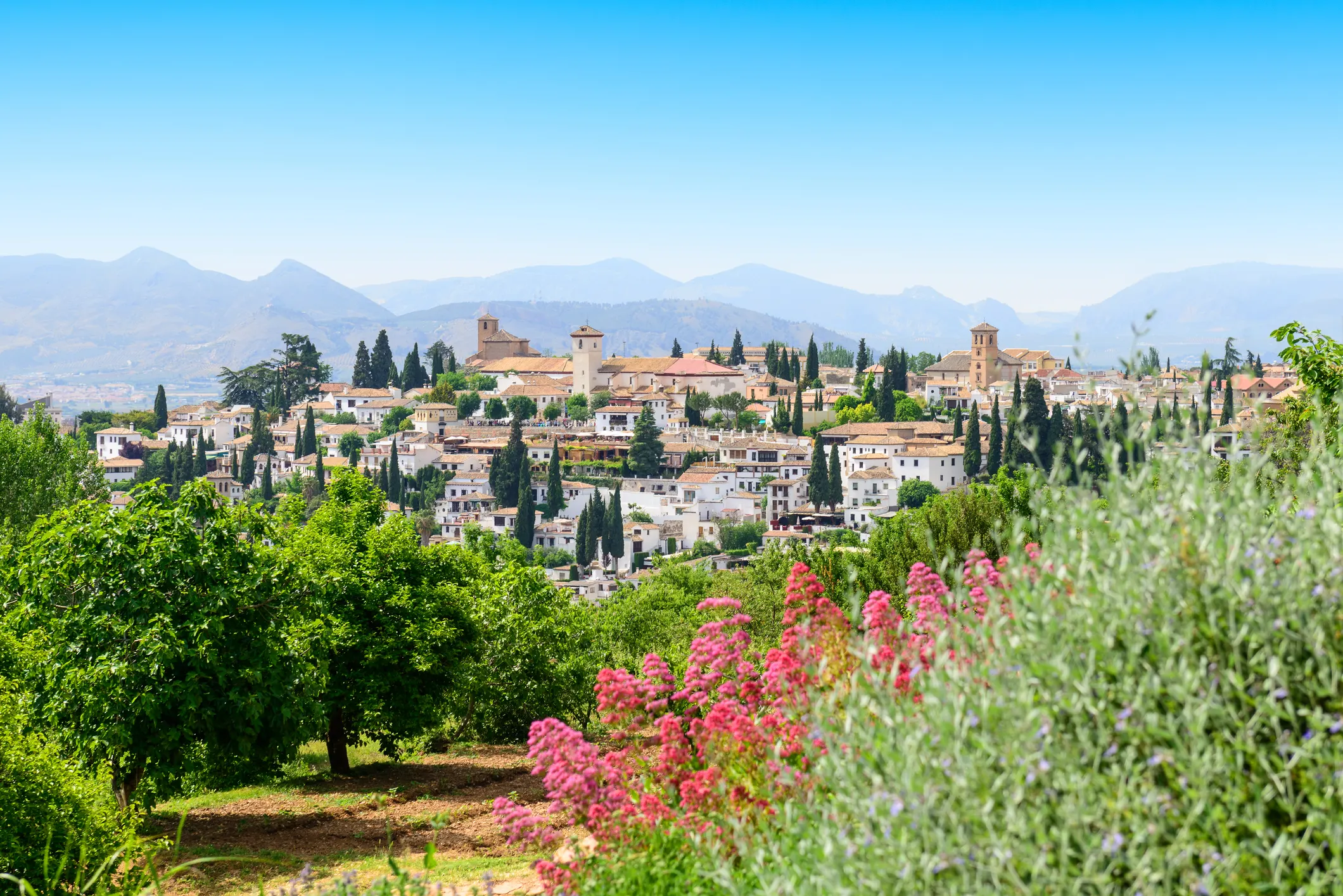
©iStock/syolacan
Granada, a gem nestled at the foot of the Sierra Nevada mountains in Andalusia, offers a blend of Moorish heritage and Spanish charm. It’s a city where every cobblestone and corner tells a story, where the Alhambra, a majestic fortress complex, watches over the city like a silent guardian of history. Granada is not just a destination; it’s a journey through time, where ancient palaces and hidden gardens whisper secrets of the past.
With a population of around 230,000, Granada boasts a vibrant community where the youthful energy from its university mingles with the traditions of the local Andalusian culture. This fusion creates a lively yet laid-back atmosphere, making it an appealing city for those seeking tranquility and a spirited social scene.
Granada’s affordability is a highlight for couples looking to embrace a rich lifestyle without the financial strain. Housing options abound, with comfortable apartments in the city center available for under $600 a month. The overall cost of living, including groceries, transportation, and utilities, averages around $1,000 for two, leaving room in the budget to fully enjoy the city’s offerings.
Granada’s culinary scene is a treasure trove of flavors. The tradition of free tapas with every drink turns every outing into a delightful culinary adventure. For just over $1, you can indulge in an aromatic café con leche or experience the local cuisine at a traditional restaurant, where a sumptuous meal for two can be enjoyed for about $25.
Granada’s allure lies not only in its historical grandeur and cultural vibrancy but also in its affordability and quality of life. It’s a city that invites you to live life at your own pace, explore its narrow winding streets, and immerse yourself in a lifestyle that’s rich in culture and kind on the wallet, all within the budget of $1,500 a month for a couple.
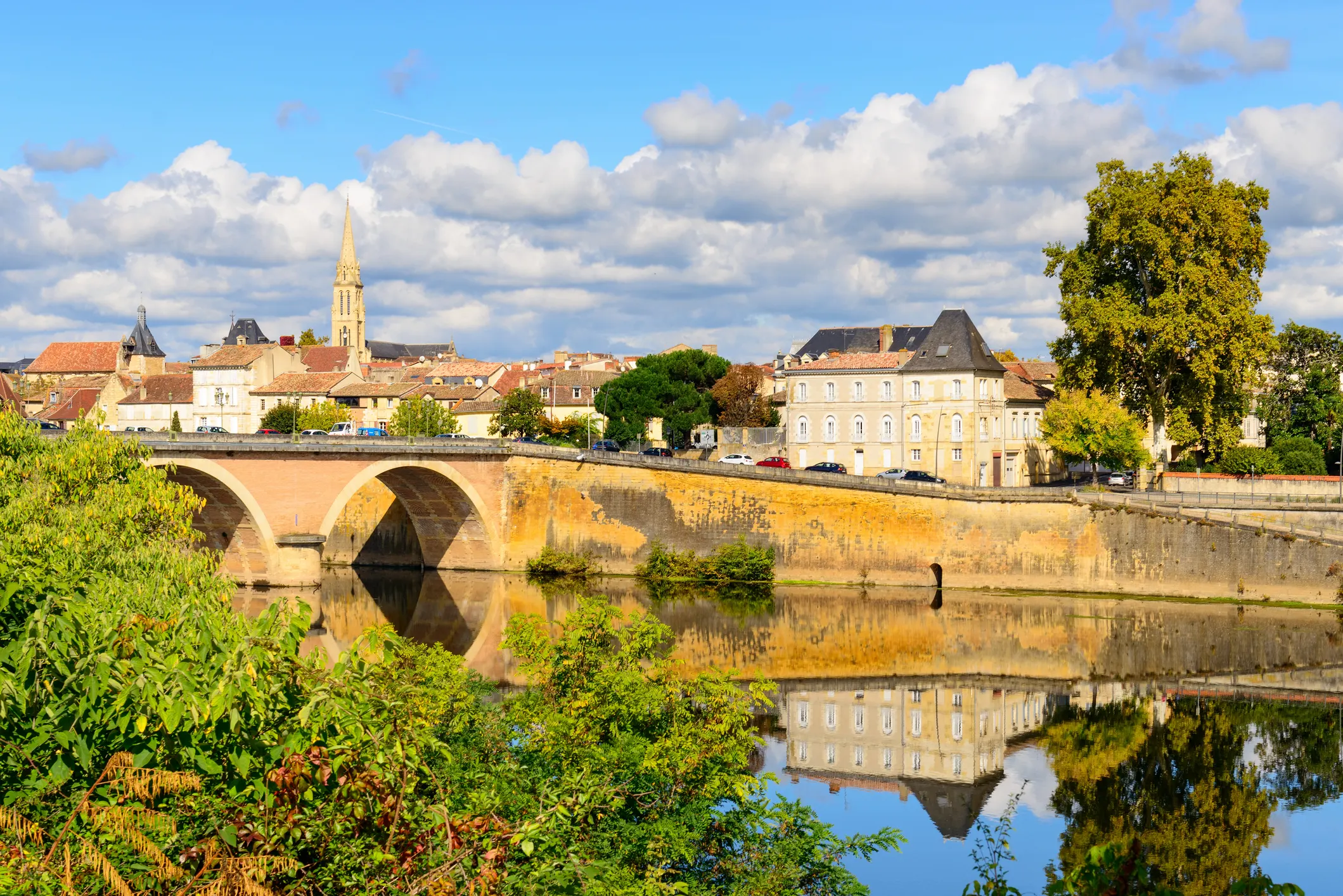
©iStock/syolacan
Both a département (the French term for a county) and a river, the Dordogne region in France is the golden heartland of the southwest, part of the huge region of Aquitaine. Just to confuse us foreigners, many French people use the name Périgord when talking about this incomparably lovely area.
Call it the Périgord, call it the Dordogne, call it heaven. For many prospective expats, this is quintessential France, the dream place to go shopping for a little maison de village, or a honey-colored stone farmhouse with a steeply sloping roof of russet-brown tiles. Everywhere here seems just so pastorally perfect, right down to the clouds of bright-blue butterflies and the lines of fluffy ducklings paddling down river.
Along with many picturesque villages, the city of Bergerac is one of the region’s commercial centers and is also known for producing some of the area’s varied wine appellations—17 in total.
The second most populated city in the Dordogne, after the administrative capital of Périgueux, Bergerac is classified as a center of art and history. Residents can enjoy a wide range of activities, including an annual jazz festival in May, book fairs, classical music celebrations, and Les Tables de Cyrano gastronomic festival, which celebrates French culinary arts every July.
Bergerac makes for an easy jumping-off point to explore the rest of southwestern France or even head further east to the beaches of the French Riviera. The central train station connects with Bordeaux to the west, with stops at Toulouse, Carcassonne, and eventually Marseille for long weekend getaways to the seaside. Expats can fly into Paris with a connection to Bordeaux or Toulouse before taking the train directly to Bergerac.
Simply enter your email address below to sign up for our free daily postcard e-letter and we’ll also send you a FREE report on The World’s Top 10 Retirement Havens for 2024.
By submitting your email address, you will receive a free subscription to IL Postcards and special offers from International Living and our affiliates. You can unsubscribe at any time, and we encourage you to read more about our Privacy Policy.


